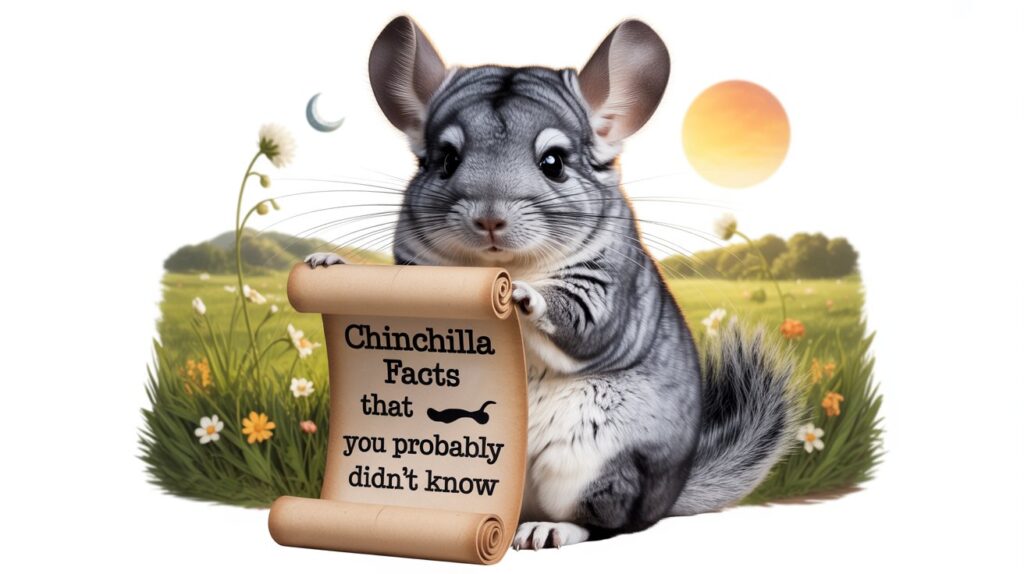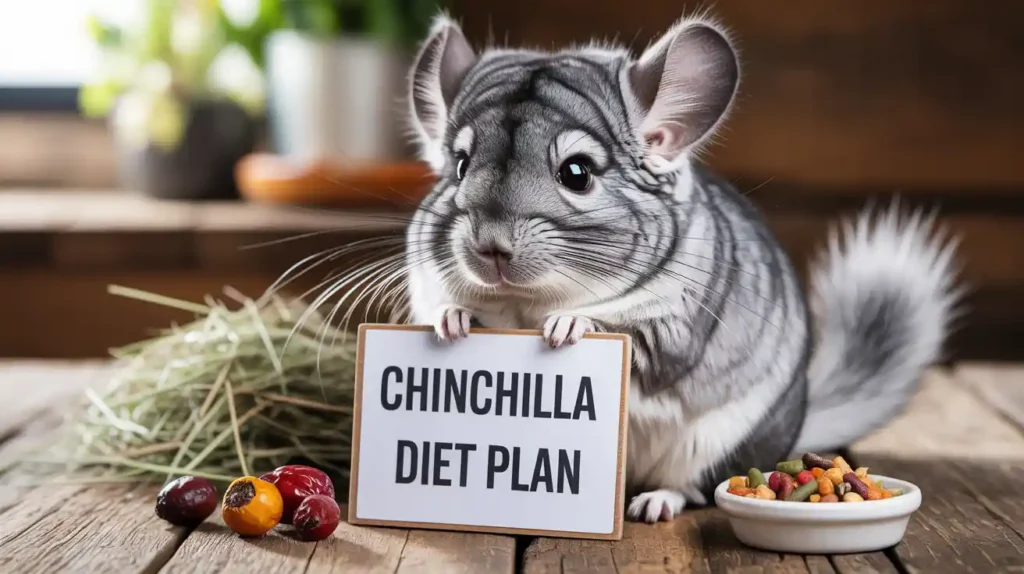Chinchillas are pretty, playful, and full of qualities. As a chinchilla owner, you obviously want to take the best care of your little friend. One question many owners ask is: Can chinchillas eat blueberries?
Blueberries are a healthy crunch into for humans, full with vitamins and antioxidants. But chinchillas have a totally different diet to us, as that what ‘s good for you may not be the same for your dangerous friend In this lead, we ‘ll also talk about is blueberry safe for chinchillas, how much they can eat, and the best way to give them this delight.
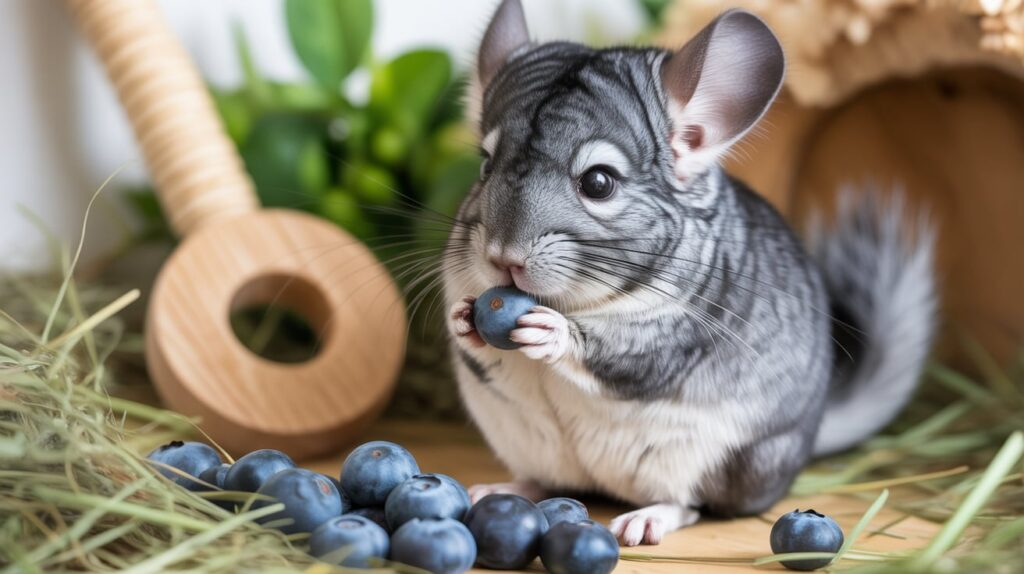
Table of Contents
Understanding a Chinchilla’s Natural Diet
Before deciding whether chinchillas should have blueberries, it’s important to know what they obviously eat. Usually chinchillas they live in the mountains of South America and have very little food. They eat grass mostly:
- Grass and weeds
- Dried leaves
- Tree bark and twigs
- Occasionally seeds
This diet is really high in fiber and very low in sugar. Their digestive systems have tailored to this type of food. When we give chinchillas Fruit or sweets, we are simply introducing something their bodies are not used to.
Can Chinchillas Have Blueberries?
The short answer is yes, chinchillas can have blueberries, but only in small amounts. Blueberries are not toxic to chinchillas, so eating them they will not make you poisoned. They’re also high in natural sugars which are can upset your chinchilla’s stomach if given too much.
Think of blueberries as a delight for your chinchilla. They are not bad to eat once in a while but very unhealthy in large quantities.
Why Blueberries Should Be Limited
Chinchillas have sensitive stomachs. Too much sugar – even from natural fruits – can cause:
- Indigestion – diarrhea, gas, or bloating.
- Obesity – extra calories can cause weight gain.
- Dental problems – sugar can damage their teeth over time.
Although blueberries safe for chinchillas in small amounts, you should limit how often they get them, for their health.
Chinchilla Eating a Blueberry – Cute but Rare
No wonder how much people love a chinchilla eating a blueberry. They hold the fruit in their tiny little toes and really do such an amazing job of biting at it slow, it makes any pet owner smile.
But remember this cute moment shouldn’t be considered a daily occurrence. Chinchilla diets are essentially hay / pellets and not fruit.
Fresh vs. Dried Blueberries
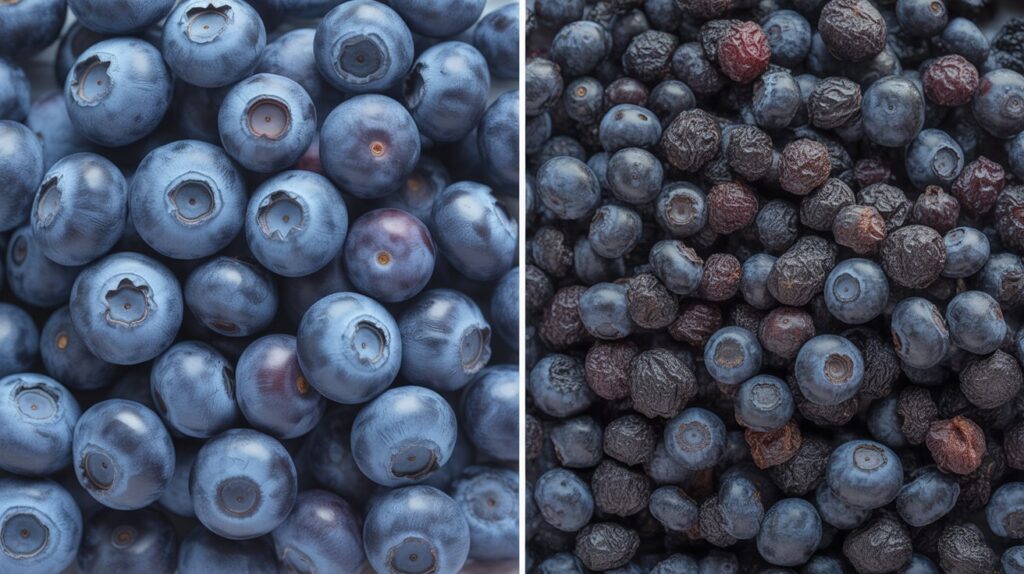
Some people say do chinchillas consume dried blueberries or should they only feed fresh blueberries?
- Fresh blueberries – Better because they have less sugar by weight, and more water. Just say a small portion though.
- Dried blueberries – Definitely not recommended. Drying kills the water and concentrates the sugar which is just way too sweet for chinchillas.
If you do give blueberries to your cat, pick fresh over dried and wash very well before serving to remove pesticides and dirt.
Can Chinchilla Eat Fresh Blueberries?
Yes they can. Fresh blueberries are probably the safest for them. The problem is portion size. A whole blueberry is too much for such a tiny animal. Split the blueberry into half / quarters and give them one piece.
Does Chinchilla Like Blueberries?
Some chinchillas just love the taste of blueberries. The taste is sweet and slightly spicy and gets them obsessed. If you give them a blueberry it’s pretty likely that your chinchilla will run over and eat it right away.
So just because a chinchilla likes blueberries does not mean they should eat blueberries often. Chinchillas do not know what is healthy for them and it’s your job to make sure they get adequate of it.
How Often Can Chinchillas Eat Blueberries?
The safest guideline is:
- Once or twice a month
- One small piece only (not a whole blueberry)
For example, you might give your chinchilla a blueberry piece on their birthday or as a reward after a vet visit.
Also, read about: What Do Pet Chinchillas Eat?
How to Give Blueberries Safely
Blueberries are an excellent tasty and healthy treat for your chinchilla. But you ‘ll want to give them in moderation. Follow these steps to make sure your pet gets them safely:
1. Choose Fresh, Ripe Blueberries
Always buy fresh, good quality blueberries. Never eat unripe or spoiled blueberries, they may cause intestinal problems.
2. Wash Thoroughly
Rinse the blueberries under cool water so any pesticides / dirt or chemicals don’t get onto your chinchilla’s system.
3. Cut into Small Pieces
Chinchillas have very small stomachs, so I cut up the blueberry into bite size pieces not to choke on it and help with digestion.
4. Offer by Hand
It’s helpful in building trust and building a bond between you and your chinchilla. It’s also more controllable about how much they eat.
5. Watch for Side Effects
Just so you know, after feeding his blueberries you should check your chinchilla to make sure he doesn’t have diarrhea or any kind of lethargy. Stop feeding him the fruit and go to the vet if necessary.
Important Reminder: Blueberries shouldn’t be eaten more than once a month, max 1-2 small pieces per week. Too much sugar can lead to fatness and digestive issues. If you want your chinchilla to eat the best diet you need to make hay/ pellets/ fresh water the main concern.
Are Blueberries Safe for Baby Chinchillas?
No. They should not have fruit at all for young chinchillas – they’re even more sensitive than adults’ digestive systems, and sugar can cause major problems in their digestive tract. Not until they are older should you let them have treats like blueberries.
Healthier Alternatives to Blueberries
Blueberries can be a healthy treat for chinchillas sometimes, but in terms of health they’re high in sugar and you only need to give them sparingly. If you’re looking for safe and low – sugar alternatives that you can give more often to your chinchillas then these foods are healthy
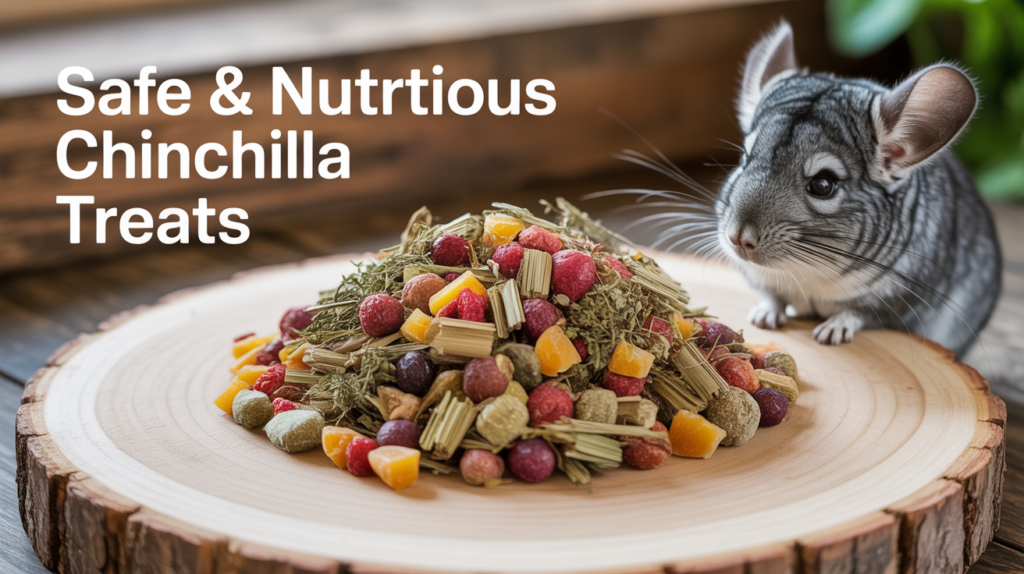
Safe & Nutritious Chinchilla Treats
- Dry Rose Hips– Natural low in sugar and high in vitamin C.
- Chamomile Flowers – A peaceful, digestive-friendly treat.
- Dandelion Leaves – Jam-packed with nutrients and safe in moderation.
- Apple or Pear Tree Twigs (pesticide free) – Great for chewing and dental health.
These can be substituted for some of the treats, but they do not have the risk of addition more sugar to the diet, so they are best eaten more often. If you bring in new foods suspiciously and in small quantities, your chinchilla will possible be fine.
Signs Your Chinchilla Ate Too Many Blueberries
If your chinchilla has too much fruit, you might see:
- Loose or watery poop
- Bloating
- Less interest in food
- Unusual quietness or lethargy
If this happens stop giving fruit and make sure they get plenty of hay and fresh water. If symptoms keep on for more than 1 day contact vet.
Extra Tips for Treating Your Chinchilla
- Treats should make up less than 5% of their diet
- Always introduce new foods slowly
- Never replace hay or pellets with fruit
- Use treats for training or bonding moments, not daily feeding
Conclusion
So, can chinchillas eat blueberries? Yes – but they should be measured a rare snack, not an everyday treat. Offer fresh blueberries in small amounts, avoid dried blueberries, and always watch for symbols of and disturb tummy. Your chinchilla’s most important diet should stay on grass, pellets, and fresh water.
FAQs
1. Can chinchillas eat dried blueberries?
Well, dried blueberries are very concerted sugar and can distress a chinchilla’s tummy.
2. Should Chinchillas Eat Blueberries?
While they can, it’s not harshly essential. Blueberries don’t give nutrients that chinchillas cannot get from their common diet. So if you never feed blueberries to your chinchilla then she’ll stay healthy.
3. Can chinchillas eat blueberry leaves or stems?
It is best to avoid the leaves and stems, as they may have chemicals or be hard to absorb.
4. Can chinchillas eat cold blueberries?
A small portion is well if thawed and served at room hotness, but fresh is always better.
5. What happens if my chinchilla eats too various blueberries?
They may have diarrhea, bloating, or loss of desire. If symptoms last more than 24 hours, contact a check.

